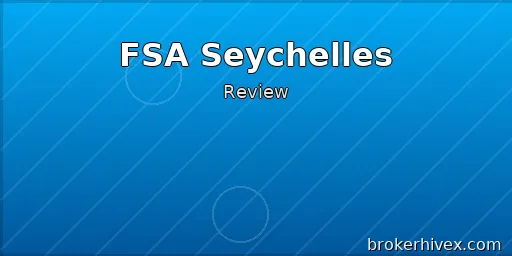FSA Regulatory Review | Is the Seychelles Financial Services Authority Reliable? How to Verify Licenses and Prevent Counterfeit Risks
Summary:Seychelles Financial Services Authority (FSA) Regulatory Review | Is the FSA reliable? This article provides an in-depth analysis of the FSA's regulatory responsibilities, license types, list of regulated platforms, official warnings, and blacklist cases. It also provides license verification steps and a multi-dimensional assessment score to help investors assess the reliability and risks of Seychelles regulation and guard against cloning scams.

I. Introduction to the Regulatory Agency
The Financial Services Authority ( FSA ) of Seychelles is the financial regulator of the Republic of Seychelles. It is responsible for regulating non-bank financial services, including foreign exchange brokers, trust services, funds, insurance and company registration services.
Official website: https://fsaseychelles.sc
Official email: [email protected]
The FSA was established in 2013 with the primary objective of ensuring transparency and compliance in Seychelles as an international financial center through its legislative and regulatory framework. However, within the global forex industry, the FSA is often viewed as a "light regulatory" or "offshore" agency, attracting a large number of retail forex brokers to register.
II. Scope and Functions of Supervision
Regulated entities : Foreign exchange and contract for difference (CFD) brokers, international business companies (IBCs), funds, insurance, and trusts.
Functions : Issue licenses, monitor compliance, investigate violations, and maintain a database of registered companies.
Characteristics : Compared to the FCA (UK) or ASIC (Australia), the FSA has lower capital requirements and compliance requirements, and is therefore often criticized as a higher-risk offshore license location.
III. License Types and Application Key Points
In the field of foreign exchange and financial services, the main license categories provided by the FSA include:
Securities Dealer License
Forex/CFD brokers mainly use this type of license
Capital requirement: approximately US$50,000
Need to set up a local company in Seychelles
Fund management and trust services
Insurance and reinsurance business
IV. Examples of Regulated Objects
The following are some foreign exchange/financial institutions that hold valid FSA licenses (which can be verified in the official database):
Equiti Securities Seychelles Ltd – Official Website
Exness (SC) Ltd – Official Website
IC Markets (SC) Ltd – Official Website
Pepperstone Markets (Seychelles) Ltd – Official Website
V. Blacklist and Warning Cases
Although the FSA provides supervision, its "relaxed" nature is often exploited by illegal platforms. Some cases:
SVG and Seychelles spoofs : Many scam platforms claim to be “FSA regulated”, but the actual license has been cancelled or is not in the database.
Official FSA warnings page : Warnings – FSA Seychelles
Common risks:
The platform misappropriated the name of the licensed company
Falsely displaying “FSA certificate screenshots”
Continue to solicit customers under the name of FSA after closing the official website or transferring the domain name
VI. License Verification Steps
Visit the official FSA website: https://fsaseychelles.sc
Click Licensee Search
Enter company name or license number
Verification:
Company Full Name
License Type (Securities Dealer)
Status (Active/Revoked)
Registration number and registered address
7. Comparative Analysis
| Regulatory agencies | Capital requirements | Client funds segregation | Complaint Mechanism | International recognition |
|---|---|---|---|---|
| FSA Seychelles | $50,000 | Yes, but loose | limited | Medium to low |
| FCA UK | £730,000 | strict | Financial Ombudsman Service (FOS) | high |
| ASIC Australia | AUD 1 million | strict | AFCA dispute resolution mechanism | high |
| CySEC Cyprus | 730,000 euros | strict | Investor Compensation Fund | medium to high |
8. Multi-dimensional evaluation (10-point system)
Transparency: 6/10 — The official website provides a database, but the information is limited
Penalty severity: 5/10 — Few cases, limited enforcement
Investor Protection: 4/10 — No compensation fund, higher risk
International Recognition: 6/10 — Common in the forex industry, but less reputable than FCA/ASIC
Verifiability: 7/10 – License status can be verified directly through the official website
IX. Risk Warning and Conclusion
The FSA is a legitimate national regulator , but due to its lighter regulatory standards, it is often regarded as a “bridge license” or “light regulatory option”.
When choosing a broker with an FSA license, investors should also verify whether it is also regulated by a higher level (such as FCA, ASIC, CySEC).
If you encounter a platform that only claims to be "regulated in Seychelles", you need to be cautious and guard against the risks of counterfeiting and unlicensed operation.
👉 Conclusion: FSA regulation has a certain degree of legitimacy in terms of compliance, but investor protection is insufficient and the risks are relatively high, making it suitable for articles in the "Risk Assessment" section .
⚠️Risk Warning and Disclaimer
BrokerHivex is a financial media platform that displays information sourced from the public internet or uploaded by users. BrokerHivex does not endorse any trading platform or instrument. We are not responsible for any trading disputes or losses arising from the use of this information. Please note that the information displayed on the platform may be delayed, and users should independently verify its accuracy.

